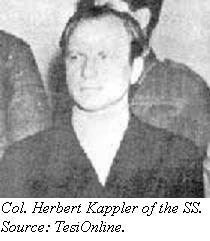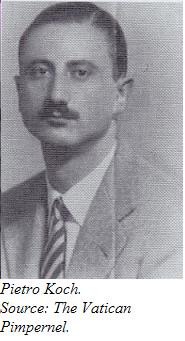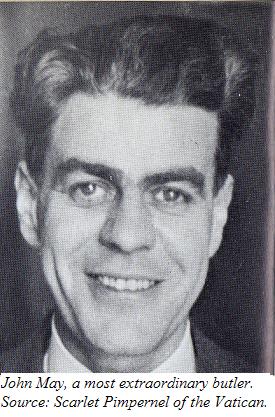Monsignor O'Flaherty
Enemies.
 On July 19, 1943, the Allies bombed Rome. The Italian Fascist administration crumbled, and Mussolini was arrested. By September 8, surrender to the Allies had been arranged. Prisoners-of-war began to pour out of the now-unguarded camps, and head in droves to Rome. But they were premature. Between September 11th and 23rd, the Germans occupied Rome, rescued Mussolini, and set up a military government. The danger was greater than ever. And there were two men in particular to be very frightened of.
On July 19, 1943, the Allies bombed Rome. The Italian Fascist administration crumbled, and Mussolini was arrested. By September 8, surrender to the Allies had been arranged. Prisoners-of-war began to pour out of the now-unguarded camps, and head in droves to Rome. But they were premature. Between September 11th and 23rd, the Germans occupied Rome, rescued Mussolini, and set up a military government. The danger was greater than ever. And there were two men in particular to be very frightened of. One was Colonel Herbert Kappler. Born in Stuttgart, Germany, he had risen through the ranks of the SS, and had won his superiors’ admiration for his brutal suppression of the Belgian resistence during the early stages of the war. He was now appointed Head of the Gestapo in Rome. One of his first acts was to demand a ransom of two million pounds of gold from the Jews of Rome—if it was not paid, they would be deported to Germany. With the help of many Italians, the amount was raised. But the deportation went ahead anyway, supervised by Kappler. Some 1,000 Jews were sent to Auschwitz. About 16 survived.
Later in the war, Communist resistance fighters set off a bomb that killed 32 German soldiers. In retaliation, Kappler chose ten Italians for every German killed, marched them to the Ardeatine Caves at Domitilla, and machine-gunned them down. When the shooting was finished, the entrances to the caves were blown up, sealing the victims, whether dead or wounded, behind tons of rock.
 Then there was Pietro Koch. An Austrian by birth, he was head of interrogation for both the Italian Fascists and the Gestapo, and was known as “an acknowledged master of tortures both crude and refined.” Gallagher describes a few of Koch’s methods: sometimes he would strap the subject into a leather belt studded with narrow steel spikes, and slowly tighten it. Another trick was to systematically file to the subject’s teeth down to the sensitive roots. Undeniably a sadist, Koch liked to supervise SS torture sessions and was probably the most hated person in Rome.
Then there was Pietro Koch. An Austrian by birth, he was head of interrogation for both the Italian Fascists and the Gestapo, and was known as “an acknowledged master of tortures both crude and refined.” Gallagher describes a few of Koch’s methods: sometimes he would strap the subject into a leather belt studded with narrow steel spikes, and slowly tighten it. Another trick was to systematically file to the subject’s teeth down to the sensitive roots. Undeniably a sadist, Koch liked to supervise SS torture sessions and was probably the most hated person in Rome.
Friends.
These, then, were the kind of men that O’Flaherty was up against, if he was determined to stand for humanity. And the numbers of those in danger was rising daily. O’Flaherty decided to ask for help. The first person he approached, although a logical choice, was not someone O’Flaherty would normally befriend: Sir Francis Godolphin D’Arcy Osborne was an English gentleman, cousin to the Duke of Leeds, and British Minister to the Holy See. Since most of the escaped POWs were British, O’Flaherty assumed that Sir D’Arcy would want to do something. The Minister thought the whole situation was “acutely embarrassing for His Majesty’s Government,” but unfortunately he could not risk compromising the Vatican’s neutrality. One can imagine O’Flaherty’s Irish blood was close to boiling after this speech. But D’Arcy wasn’t finished; he suggested the priest have a “quiet chat” with the Minister’s butler, a small, inscrutable Cockney named John May. “I don’t want to know any details,” J.P. Gallagher has the Minister say, “but I have a good idea he can help you!”
 John May, O’Flaherty would later say, was a special kind of genius: “the most magnificent scrounger I have ever come across.” May had an incredible talent for obtaining things that weren’t supposed to be obtainable. Did the escapees need shoes or clothing, no questions asked? Not a problem. Did they need more food than wartime rationing allowed? John May could get it. Like O’Flaherty, May had friends everywhere, particularly in the black market. Numerous useful people owed him favors. As shrewd and careful as O’Flaherty was large-hearted and innocent, John May proved to be the perfect counterpart to the Monsignor.
John May, O’Flaherty would later say, was a special kind of genius: “the most magnificent scrounger I have ever come across.” May had an incredible talent for obtaining things that weren’t supposed to be obtainable. Did the escapees need shoes or clothing, no questions asked? Not a problem. Did they need more food than wartime rationing allowed? John May could get it. Like O’Flaherty, May had friends everywhere, particularly in the black market. Numerous useful people owed him favors. As shrewd and careful as O’Flaherty was large-hearted and innocent, John May proved to be the perfect counterpart to the Monsignor.
Also involved was Count Sarsfield Salazar of the Swiss Legation, very helpful in procuring neutral Swiss identity papers and oiling diplomatic wheels. Thomas Kiernan, the Irish ambassador to the Vatican, had to adhere strictly to his country’s policy of neutrality, but his wife, the noted singer Delia Murphy, had a freer hand and helped where she could—seeing that O’Flaherty had the use of the Irish Legation’s car when he needed it, for example. Molly Stanley, a middle-aged English governess, was another good friend of O’Flaherty’s who turned out to be a tireless worker on his behalf. She had lived in Rome since her early twenties, and her insider’s knowledge of the city was invaluable. Behind the scenes, Sir D’Arcy quietly supplied money. With these people aiding O’Flaherty, the rescue effort started to take on the appearance of an organization.